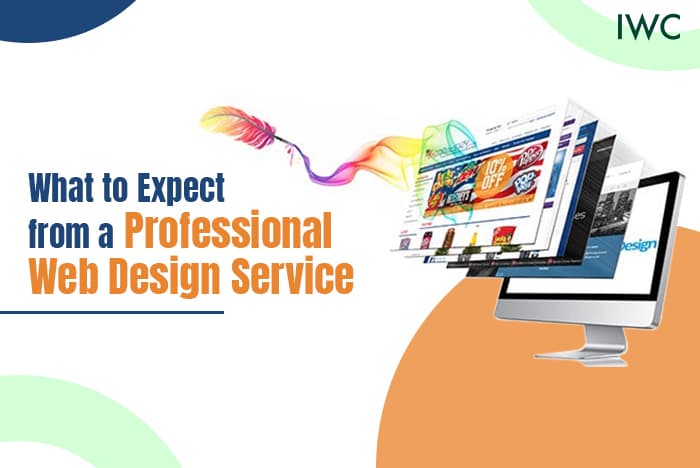What to Expect from a Professional Web Design Service

It's not just about looking good, because when you invest in professional website design services, you pay for an experience where your business shapes up and is perceived online. A well-designed website has the capacity to make quite a difference in gaining new customers and retaining old ones, pushing sales, and building brand credibility. What to expect from professional website design services in India: In this article, we dive into breaking down the process, key features, and the benefits that come along with it.
1. Initial Consultation and Discovery Phase
A good website design service commences its duties by conducting an initial consultation, whereby the designers and developers get to know your business, goals, and target audience. This is usually a very important phase in the whole process of website building, as it lays down the foundation on which the entire project will be based. Here's what happens during this stage:
Understanding Your Business: The service provider shall draw from you detailed information about your business, your industry, products or services, and competitors. They'll be talking with the brand identity of your company, including your logo, color schemes, and any existing marketing materials.
Defining Your Goals: You will work together in defining the main objectives of the website. This might include generating leads, selling products, or simply information. Knowing your goals helps the design team come up with a website that will suit you.
Target Audience Analysis: Knowing who your target audience is, along with their demographics, preferences, and online behavior, allows the design team to tailor the website to appeal to the right people.
Scoping and Requirements: This is also the phase of stating the scope of your project, by mentioning the number of pages, functionalities involved, and whether there are any specialized requirements for it-like incorporating an e-commerce feature, contact forms, or an integration with third-party tools.
2. Strategic Planning and Design Concept
Once the discovery process is over, the design team will have a strategic plan of action and a design concept in place for your website. This includes:
Site Mapping: A site map shows the overview of your website structure, including how different pages are organized and interact with each other. This helps give a complete view for better planning of the user's journey through the website and allows for easy navigation.
Wireframes: Wireframes are basic sketches or layouts representative of where elements will go on each page. This gives a rough view of what the overall site structure will look like before actually doing the detailed design work.
Design Mock-ups: After the approval of wireframes, the design team creates high-fidelity mockups that showcase colors, fonts, images, and the feel and look of the site. This provides a clear view of how the final website would look.
Planning for Responsive Web Design: Since mobile devices are in everyday use these days, a professional web design service will ensure that your website is fully responsive, meaning the design must work on different screen sizes and on other devices for the best user experience.
3. Content Strategy and Development
Content is the integral part of a website. A professional web design service will either help you to develop the content or work with you to ensure the content would be suitable for the design and business objectives. This encompasses:
Content Creation: Everything, from copy writing for your homepage and product description to blog posts, and even down to visual creatives like images and videos, can be helped by the service provider in developing quality content which will really resonate with your audience.
SEO Integration: A well-designed website means that it is also optimized for search engines. The design team will ensure that the structure of the site is maintained, contents are put in place, and meta tags are optimized to help your website climb higher in search results, attracting more organic traffic.
Content Management System: Should your website require frequent updating of its contents, a design team will integrate an easy-to-use CMS such as WordPress, Drupal, or Joomla. This will no doubt enable you to manage and update your contents with so much ease, even without so much technical knowledge.
4. Custom Development and Functionality
A professional web design service goes beyond aesthetics and focuses on the functionality that meets your business needs. This shall include:
Custom Coding: If the website requires custom features or integrations out of the box, beyond standard templates, then the development team will be writing custom code to bring your vision into reality. This could include e-commerce functionality, membership portals, or custom forms.
Third-Party Integrations: Be it an integration with a payment gateway, CRM systems, email marketing tools, or even social media platforms, the development team will make sure this is integrated smoothly to further enhance the capabilities of your website.
Performance Optimization: Professional web designers give priority to the performance of the website to be at its best, offering fast loading, efficient coding, and minimum or no downtimes. This includes optimization of images, caching, and limiting the use of heavy scripts that bog it down.
Security Features: The modern digital space has given importance to web security. The design service will implement security features involving SSL certificates, updates, and secure coding in order to protect your website from vulnerabilities and attacks.
5. Testing and Quality Assurance
A professional web design service will do comprehensive testing of the website before launch to ensure smooth functionality on all devices and browsers. This involves the following:
Cross-Browser Testing: Testing on a variety of browsers, such as Chrome, Firefox, and Safari, will enable the team to be sure of consistency in performance and appearance.
Mobile Responsiveness Testing: Since much of the web traffic is created through mobile devices nowadays, testing how the website will render into various mobile devices and screen sizes is essential.
Functional Testing: Test all the functionalities ranging from forms, shopping carts, and other interactive features. This will also include broken links tests, form validation, and payment processing tests.
Load Testing: The team will further simulate a high volume of traffic on the website to test its performance under stress, ensuring it doesn't go down anytime there's a surge of visitors.
6. Launch and Post-launch Support
Once the website has passed all tests and has your final approval, it is time to launch. A professional web design service will handle every process in launching your site that includes:
Domain and Hosting Setup: The team will set up your domain and hosting, making sure your website goes live and accessible to the public.
Configuration of DNS: DNS configuration is an important task in assigning the domain name to the right server to ensure your website loads as it should.
Final Checks: The team goes through the final round of checks before making it officially live, ensuring everything is in place-contents, images, functions, among others.
Post-launch monitoring: After launching, it monitors the website for problems that could arise and makes necessary adjustments. It includes keeping track of performance, squashing bugs, and making sure that the site runs smoothly.
7. Ongoing Maintenance and Support
The professional web design service does not stop after launching. If one wants to keep his/her website up and running and also current, then ongoing maintenance and support are quite critical to it. Here is what is expected:
Regular Updates: Websites do require regular updates to keep them in the race with newer technologies, security patches, and updates of content material. Service providers ensure that software updates are regularly carried out on your website, its plugins, and themes to keep it functioning and secure.
Aside from that:, the service providers can also help update the regular website content if one does not have the time or resources: addition of new blog posts, updating of product information, refreshing of images on the website.
Technical Support: Be it some problem with certain malfunctioning or how to work a particular feature within your website, a professional web design service will include ongoing technical support. In this way, no problem remains unsolved for a long time, and this helps in minimizing downtime and disruptions.
They will monitor the performance of your website regarding site loading times, uptimes, and other metrics about user experiences. That does allow them to make necessary adjustments to continue running your website perfectly.
Security Monitoring: With an experienced provider, ongoing security monitoring can protect a website against cyber threats. They would monitor any suspicious activity, perform regular security scans, and take proactive measures necessary towards safeguarding your website.
8. Analytics and Reporting
Understanding how your website is performing will play an important role in its success. A professional web design service should give you analytics and reporting so you can track and analyze the working of your website, which includes:
Traffic Analysis: Google Analytics or any tool the service provider will set up, showing the number of visitors, their behavior, source of traffic, among other parameters. This helps in understanding how well your website is drawing users and engaging them.
Conversion Tracking: If the objective of your website is to catch leads or sell products, then the service provider sets up conversion tracking in order to accurately determine how well your website is meeting that objective. It ranges from form submissions and product purchases to any other on-site actions you wish users to take.
User Behavior Analysis: Heat maps, session recordings, and similar tools easily depict how users think once they come to your site. This data shows which parts of your website are most interactive and those that need improvements.
Regular Reporting: A professional web design service would definitely provide one with periodic reports, summarizing the performance of the website, keeping in view the important metrics such as traffic flow, conversions, bounces, and other forms of user engagements. These reports help in prudent decision-making about what other updates and improvements are subsequently required.
9. Customization and Scalability
A professional website design service realizes that every business is unique and has its specific needs; hence, it can offer a service with options of customization and scalability to let your website grow and evolve with your business. This includes:
Custom Solutions: The service provider will not rely on any pre-made template; rather, they will create a custom website that actually reflects your brand's identity and meets your specific needs.
Scalable Architecture: Your business will grow, and with it, so will your website- More traffic, extra content, new features. All this is good to know, as a good web design service will make sure the architecture of the website it creates is prepared for further modification, whenever required, easily.
Future-Proofing: This involves the service provider considering the future trends and technologies to make sure your website will be relevant and functional as times change. This includes planning for future integrations, updates, and potential redesigns.
10. Collaboration and Communication
During the entire process of web design, collaboration and communication are major ingredients in a successful project. Here is what you should expect:
Regular Updates: It means that the service provider shall let you know how the project goes and will take your feedback on each stage of the project.
Open Channels of Communication: This way, you will like direct exposure to the design and development team to ask questions personally and provide your valuable input, apart from making decisions.
Collaboration Tools: Most web design services use project management software, design review platforms, and communication apps to facilitate easy collaboration.
Integrating Feedback: Your feedback on any project is of paramount importance to make it successful. They will constantly involve you with active queries and make revisions in line with your preference and needs.
Conclusion
The service of professional web design is way more than building an attractive website; rather, it is about creating a powerful online presence that drives business success.
From the initial consultation to ongoing maintenance and support, a professional website design company India may offer you an extensive and customized approach to meet your unique needs. That is so because by collaborating with experienced Indian website designers and developers, you would have a website which not only looks great but performs exceedingly too, thus giving you the ability to realize your business objectives and stand out in the competitive digital landscape.
Recent Blogs

9 Reasons Why a Logo is Important to Your Business?

Top Benefits of Hiring a Website Developer from India
